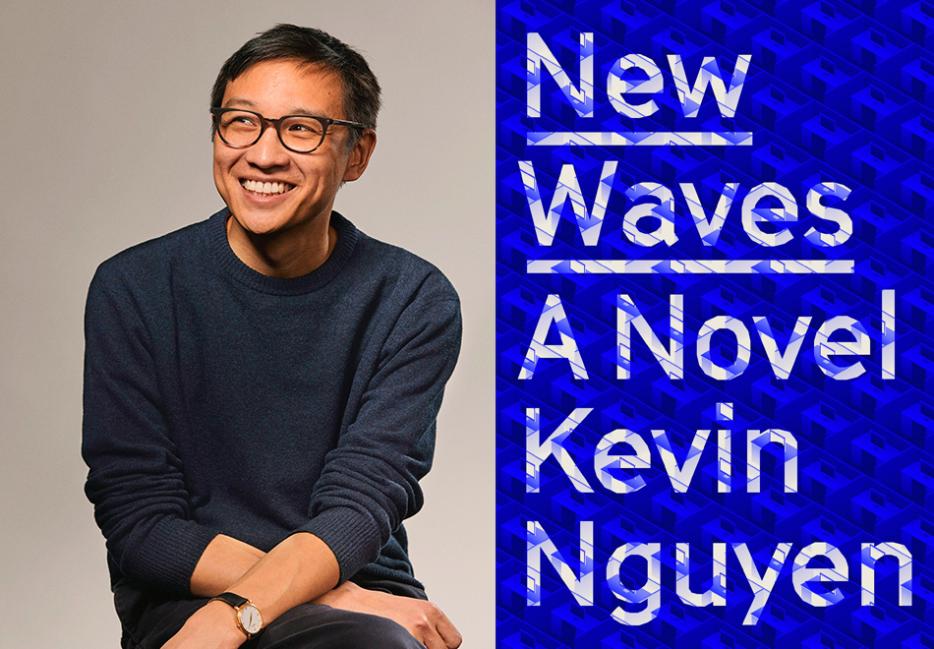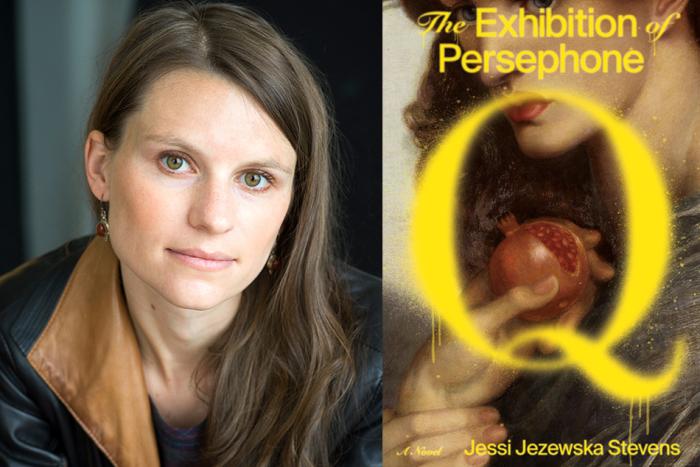New Waves (One World), the debut novel from features editor for The Verge, Kevin Nguyen, is millennial in every way. The protagonist, Lucas, a Vietnamese dude, ends up working customer service at a tech job (relatable) where everyone assumes he is an engineer. He clings to his friendship with Margo, a vibrant, no-shit-taking Black woman at the company.
Nguyen writes brilliantly of identity, never assuming an oppressive narrative on his characters, but furthering the complexity of their humanity. He weaves a deft story exploring capitalism, race, gender, underground online communities, and the startling shift in privacy and technology itself. With New Waves, Nguyen has ambitiously reshaped traditional forms of the novel, diversified characters, and addressed technology for all its good, as well as all its bad.
Sruti Islam: Has writing a novel has always been on the horizon for you?
Kevin Nguyen: It’s kind of an annoying origin story because the entire thing is kind of very haphazard. I mean, if we even just take a step back—I always wanted to write and edit. I never thought I’d get to be able to do it professionally in journalism. That idea felt very far away from me, as did writing a novel. But basically, I get kind of anxious on the subway, and I write on my phone a lot when there’s not enough space to read a book.
There was this time in my life where I just didn’t have any assignments—this is before I was working professionally, so I was jotting down whatever into my notes app. You know, like, some imagined dialogue, stories I wanted to write, some things that happened at work, and loose concepts for funny sci-fi stories. I just put it all on the same note, and eventually the note got so long that the app crashed.
So, I went to my computer and I copied and pasted out of the notes app into a Google doc, and it turns out I’d written something like 20,000 words. And at first, I was like, “What have you been wasting your time doing? Twenty thousand useless words!” And then I kind of read through it all, and it really was a mess, but I just kind of sensed that there was an interesting through line through all of it. So that kind of became the foundation of the novel.
You can see it in the book, too. Structurally, the book is a bit all over the place. Which I kind of love about it. But you can see how it started out as a bunch of loose ideas in an app.
The book isn't driven by some massive plot chase, but readers will find themselves compulsively turning the page regardless. Were you intending to play more with time or format?
When I started writing it as a more extended work of fiction, I started writing around the form more deliberately. But I’m actually glad that you point that out, because I think that was the biggest challenge for me. I just like when things are kind of high-concept and then executed as boring and slowly as possible—you know, I like things that are plotless. I think at the beginning the book kind of poses that there will be a bit of a plot, but it moves away from that quite quickly. It tells the reader that it’s not going to be a mystery pretty early on. And I think that the things that are happening in the book are constantly resisting plot, and it kind of mirrors Lucas’s journey, and in some ways Jill’s. But both are in search of a narrative structure to grief, and it doesn’t exist. They keep trying to do things to try to find that plot for themselves, and it just keeps not happening.
So that was a challenge for me. I wanted something that would read quickly—I like books that also read quickly, which still resist the things that give a story a familiar shape. I spent a lot of time thinking about that, so I actually really appreciate you bringing that up first.
Definitely. I mean, it’s such a shift in form. The climax happens in the first couple of pages, and the whole thing ends on a kind of new beginning. How did you map out the writing of this book from beginning to end?
I didn’t really outline the book at all. I didn’t really have an ending in mind when I started. So, it was a lot of rearranging. I think earlier drafts were a lot more convoluted, it jumped back and forth in time a lot more. The more I moved away from a conventional structure, the better the book worked, I think. It’s kind of funny, I know it’s going to frustrate a lot of readers. I understand that. A lot of people are just not going to like that, just the way it kind of moves all over the place. But I just like the structure of a story that serves as a kind of spiral. It just keeps going around, zeroing in on something slowly and kind of circuitously. It’s a book with a lot of disparate ideas and themes going on. And I wanted those things to slowly tie together indirectly.
I applaud your construction of all these varied ethnicities. My question is in relation to that Zadie Smith essay about who gets to write fiction, and then in thinking about the American Dirt stuff… Personally, I feel like New Waves is the correct response in that debate. It’s clear that it was important to you as an author to write with love and care for your characters, but there never felt like a voyeuristic betrayal. But that does not seem like an easy thing to accomplish—how did you do it?
[laughs] Honestly, it was less deliberate than wanting to go out there and do this version of this thing right. I just wanted to write characters that I was interested in. I was also just very interested in a story about a friendship between people who look different and who have different experiences. Because, as you know, you’re a person of colour, that’s just what our lives are. It’s very rarely reflected in literature specifically, which I always find very odd, because I feel like literature is usually pretty far ahead of all the other mediums.
So, I guess I’ll just start by saying that I think there are a lot of people out there who believe that you shouldn’t write an experience that’s not your own. And I actually understand that argument. I think there is a case to be made for that. I just personally feel like, if those are the rules, then you’ll just never get a book where an Asian man and a Black woman are friends, and that’s a way darker outcome to me.
Obviously writing Lucas was easier than writing Margo, which went outside of my personal experience, even though I have lots of friends with similar experiences. But I think the secret was to make her as specific as possible. The book deals with race and racism, but these characters are not stand-ins for a bigger conversation. They’re just having their conversation.
Again, Margo is an extremely specific character with an extremely specific personality and specific interests. So even though Blackness is at the center of a lot of her personality, it’s not the only part of her personality. And that was really important to me in writing characters who look different.
I do understand that there’s a reality where there will be readers who do not like my portrayal of a Black woman and that’s totally fair criticism.
I think it’s a very fair response. There’s this tendency with writers to have great affection for the characters they create. Is that also the case for you?
That’s an interesting question. I think they’re all extremely flawed. And their flaws are loud, too. It’s funny because I knew this would happen. Where, because the point of view of character was an Asian man, people would just kind of draw this line between me and Lucas. Which is always kind of funny because I would never make decisions as bad as Lucas does [laughs]. He’s kind of a dumb fuck?
[both laugh]
Oh yeah, I’m going to get to that.
But you know, there’s bits of myself in all the characters. Those parallels are just a little less obvious.
Right, but I don’t mean that you’re similar to them, it just seems like you created them with care, flaws and all.
Yeah, I think that’s true. I think I like Margo the most if I’m ranking them. It’s interesting, too, because in earlier versions of this book, I think the characters were even more unlikeable. And that softens over time through a few editors. The original version of it had three screw ups, and I don’t think it quite reads that way anymore, which I think is for the best. And I do find myself thinking about these characters a lot. It always sounded cheesy every time I heard an author say that, but then I tried my hand at this myself and realized, oh yes, I’ve spent a lot of time with these people. It feels like family, you just kind of have to love them, and you just do.
It’s interesting that you point out these characters began more unlikeable than they ended up. Is it true what they say—is writing unlikeable characters just much more fun?
I think that’s right. It’s fun and intellectually more rigorous and interesting. I don’t think any character in the book comes across as super well in many ways, and I think it would be boring if they did.
Were you on LiveJournal?
I never had LiveJournal, but I was definitely on a lot of blogging platforms. A lot of internet forums. I think in the era of LiveJournal I was probably on music forums, which kind of has the same energy, right? The same kind of community. These sites don’t actually look that different.
Do you think that participation informed you as a writer?
Oh yeah, for sure. I’ve just been writing for a long time in non-professional capacities. I think that writing is just this thing, where a lot of effort and talent is involved, for sure, but is just something you have to do for a while before you figure any of it out. You know, you can sort of tell when people have only ever written in school. There’s just a level that we just can’t crack.
It’s kind of amazing. I also miss that era where you were just intimate with strangers on the internet, we were all faceless, this was an era we were still using anonymous handles, we were discovering weird new music this way, and it just doesn’t quite happen that way anymore.
What do you think it was about these online communities that fostered such an intimacy, and why is Twitter a total failure at replicating it?
[laughs] It’s funny because I don’t want to be totally pro-anonymity because I think we live in an era with a lot of trolling, but it was sort of before coordinated harassment was a thing that happened all the time. The anonymity of these places just felt a little bit freer.
One thing that I put in the book was that when I was in middle school I would get bullied all the time basically just for being Asian and not realizing that that’s what was going on. And then I would be on these internet forums, and it’s not that I wasn’t proud of being Vietnamese American but you just didn’t have to be on these forums? You didn’t have to identify as that. And you play into these other hierarchies on these internet forums, but it just momentarily unburdens you of your identity. Here’s a community where you don’t have to be this thing.
Absolutely.
I just think it’s kind of interesting. You really form your identity from the ground up on the internet.
Right, there were no follow-up “How do you pronounce or spell your name again?” questions happening. You just had this username that stood in for all that.
In the novel you create this app, Phantom, and the appeal of this app is that it ensures that your posts disappear in real-life time after sending them. You have this great paragraph where you compare the app’s commercial success to its real-life appeal, you say, “It’s like having a conversation in real time.” Okay, so my chill question is, why do you think tech thrives on recreating the real? Why isn’t the real enough?
That’s interesting. Because… it’s harder to monetize, honestly. [laughs] That’s the real driver of all technology, honestly. We’ve actually found just every quiet little moment to make money off of. Every breath we take now is being used by Google to target ads towards us. I don’t think it’s a cool, wholesome thing, it’s just literally capitalism creeping into every quiet moment of our lives.
Right. I feel so dumb as a consumer. Does it not just make you feel dumb?
Yeah! It feels stupid that we didn’t always realize the internet was going to become this? We just accelerated capitalism.
You’ve kind of alluded to this already. I think it’s pretty clear that Lucas doesn’t treat Jill great, and I wonder if as a man it’s fun to write the character of an immature male, or painful?
Oh, it was definitely painful. I mean, consider Lucas’s journey, right. He’s this guy who’s sort of felt powerless his whole life as an Asian American man and he doesn’t have a fancy education. And throughout the book he begins slowly accumulating power, but never realizes it. Which I think is the way a lot of dumb fuck boys act in New York. It’s a book where I wanted all the consequences of people’s bad decisions (of which there are many in the book) to be emotional.
I think Lucas realizes everything all at once, not really when it’s happening. He has this revelation where it all kind of hits him at once. And I think it’s interesting because as your lives change, particularly in the workplace, there’s never a point where someone’s like, “By the way, you have power now,” so I think it’s sort of easy for a character like Lucas, and also a lot of men Lucas’s age who have felt disenfranchised for a longtime, to just not engage with the power they have.
The novel is interspersed with these various science-fiction stories. The reader eventually learns of their source. Was that your way of writing science-fiction without having any stakes to it, by positioning fiction within a work of fiction? Or was it an intentional challenge, to see how you would do with science-fiction?
It was a couple of things. You get to know characters in a book by what they do and what they say. And I just like the idea of understanding a character through their active generation. Like, can you understand a character by what they create? I thought that was a pretty cool challenge because I had not seen that done before.
Also, just that the readers experience would mirror Lucas and Jill’s, in that they too would learn about a person based on this generation. So that would parallel between the characters in the book and the readers themselves.
But also, in terms of actually writing the science-fiction stories, there was a time where I was reading a lot of Robert Sheckley. He was this sci-fi writer in the ‘60s. He wrote for those pulp-y sci-fi magazines, and all the stories are pretty funny, kind of cool, and they all have these plot twists at the end of them. And I just thought that would be pretty fun to write. I really thought of the science-fiction stories more so as an exercise in humour than as an attempt for smart science-fiction.
Maybe the next book will be purely science-fiction?
[laughs] No, I don’t think so. I do like the idea of speculative fiction, but more historically. That interests me more than something set in space.






